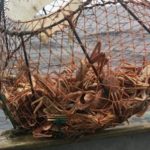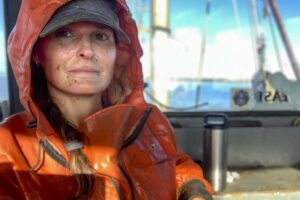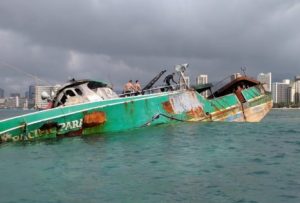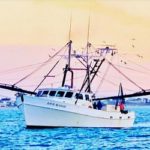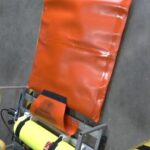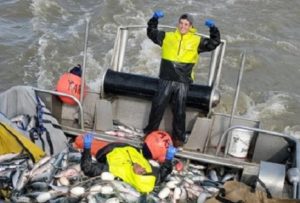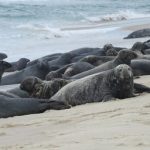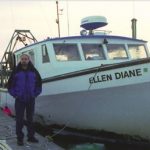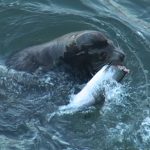Daily Archives: May 2, 2017
What’s next for Carlos Rafael’s fishing permits?
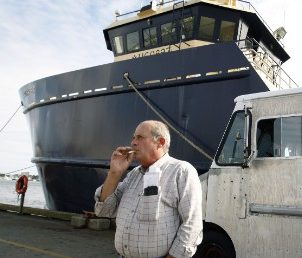 New Bedford – Almost a week ago, City Council members asked for their names to be attached to a late file agenda pertaining to Carlos Rafael’s groundfish permits. Behind Ward 4 Councilor Dana Rebeiro, Council President Joseph Lopes and Ward 5 Councilor Kerry Winterson, the council requested “that the Committee on Internal Affairs meet with Attorney General Maura Healey and NOAA to discuss how current owners and mariners operating in New Bedford have the first right of refusal to acquire licenses to be auctioned as result of the plea agreement in the case of The United States vs. Carlos Rafael… The written motion was a bit premature. Following Thursday’s council meeting, Rebeiro acknowledged the measure was “to get ahead of the ball” in terms of where the permits may land. So what’s next? click here to read the story 19:11
New Bedford – Almost a week ago, City Council members asked for their names to be attached to a late file agenda pertaining to Carlos Rafael’s groundfish permits. Behind Ward 4 Councilor Dana Rebeiro, Council President Joseph Lopes and Ward 5 Councilor Kerry Winterson, the council requested “that the Committee on Internal Affairs meet with Attorney General Maura Healey and NOAA to discuss how current owners and mariners operating in New Bedford have the first right of refusal to acquire licenses to be auctioned as result of the plea agreement in the case of The United States vs. Carlos Rafael… The written motion was a bit premature. Following Thursday’s council meeting, Rebeiro acknowledged the measure was “to get ahead of the ball” in terms of where the permits may land. So what’s next? click here to read the story 19:11
Long List of Factors Stressing Out (poisoning) Narragansett Bay
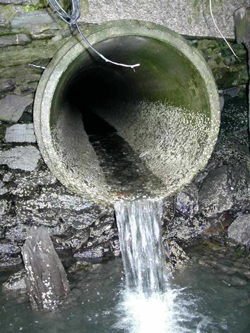 The Narragansett Bay Estuary Program has developed a draft report on the status of Narragansett Bay entitled “State of the Bay and its Watershed.” Numerous factors, beyond climate change, sea-level rise and legacy contaminants, stress Rhode Island’s most significant natural resource. Here is a look at some of the others detailed in the NBEP’s draft report.,, Population growth, Land-use changes, Impervious surfaces, Nutrient loading, Chemical contaminants of emerging concern (CECs). They include but aren’t limited to nonprescription and prescription pharmaceuticals, personal-care products, and industrial chemicals used in a wide range of consumer, commercial and industrial products. Some examples: antidepressants, antihypertensives, antibiotics, painkillers and synthetic hormones; antimicrobials such as Triclosan; UV blockers in sunscreens such as oxybenzone; DEET, a pesticide which is applied to human skin; fragrances such as synthetic musks; flame retardants such as polybrominated diphenyl ethers; additives to plastics; and synthetic materials such as bisphenol A, commonly referred to as BPA. click here to read the story 16:53
The Narragansett Bay Estuary Program has developed a draft report on the status of Narragansett Bay entitled “State of the Bay and its Watershed.” Numerous factors, beyond climate change, sea-level rise and legacy contaminants, stress Rhode Island’s most significant natural resource. Here is a look at some of the others detailed in the NBEP’s draft report.,, Population growth, Land-use changes, Impervious surfaces, Nutrient loading, Chemical contaminants of emerging concern (CECs). They include but aren’t limited to nonprescription and prescription pharmaceuticals, personal-care products, and industrial chemicals used in a wide range of consumer, commercial and industrial products. Some examples: antidepressants, antihypertensives, antibiotics, painkillers and synthetic hormones; antimicrobials such as Triclosan; UV blockers in sunscreens such as oxybenzone; DEET, a pesticide which is applied to human skin; fragrances such as synthetic musks; flame retardants such as polybrominated diphenyl ethers; additives to plastics; and synthetic materials such as bisphenol A, commonly referred to as BPA. click here to read the story 16:53
Massachusetts Court Reverses Ruling in Rotten Scallop Coverage Dispute
 The Massachusetts Appeals Court has reversed a lower court’s ruling in a case examining whether damage to scallops at a seafood processing facility, when the cause of damage is unknown, constitutes an occurrence within a commercial general liability (CGL) policy. A Superior Court judge previously concluded that defendant and insured, Raw 2 Seafoods Inc. (RSI), had no way of proving its claimed loss was caused by an occurrence and granted summary judgement in favor of the plaintiff and insurer, Hanover Insurance Group. This case, The Hanover Insurance Group, Inc. vs. Raw Seafoods, Inc., comes after a July 2011 event in which RSI-processed scallops were making their way through customs in Denmark, heading to an Atlantic customer. Upon inspection, the 37,102 pounds of scallops were found to be decomposed and were deemed unacceptable for human consumption. click here to read the story 15:51
The Massachusetts Appeals Court has reversed a lower court’s ruling in a case examining whether damage to scallops at a seafood processing facility, when the cause of damage is unknown, constitutes an occurrence within a commercial general liability (CGL) policy. A Superior Court judge previously concluded that defendant and insured, Raw 2 Seafoods Inc. (RSI), had no way of proving its claimed loss was caused by an occurrence and granted summary judgement in favor of the plaintiff and insurer, Hanover Insurance Group. This case, The Hanover Insurance Group, Inc. vs. Raw Seafoods, Inc., comes after a July 2011 event in which RSI-processed scallops were making their way through customs in Denmark, heading to an Atlantic customer. Upon inspection, the 37,102 pounds of scallops were found to be decomposed and were deemed unacceptable for human consumption. click here to read the story 15:51
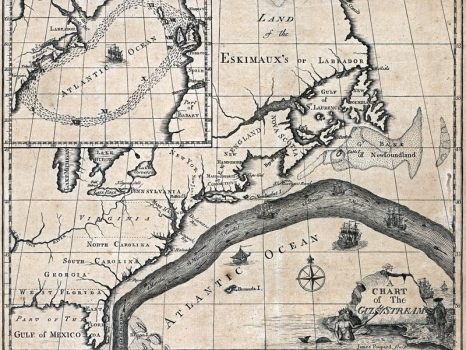
Benjamin Franklin Was the First to Chart the Gulf Stream
Texas House passes H.B.1260, The “Gulf Shrimp Liberty Act”
 The Texas House passed House Bill 1260 by State Representative Dade Phelan, which creates a new occupational license for non-Texas commercial shrimpers for the unloading of shrimp. Currently, Texas has a moratorium on commercial Gulf shrimper licenses, meaning no new licenses are being issues and haven’t been issued in several years. The shrimpers being referred to in HB 1260 are the more than 500 out-of-state Gulf shrimpers who are currently not allowed to come into Texas waters without a license. “HB 1260 opens up the Texas seafood market to 7 million pounds of Gulf shrimp and over $100 million in economic activity for the state of Texas”, Representative Phelan stated. “The ability for non-Texas shrimpers to unload in Texas also means that they will refuel, gather supplies, and perform maintenance on their boats, providing more jobs and generating sales tax revenue that will positively impact the coast.” click here to read the story 11:56
The Texas House passed House Bill 1260 by State Representative Dade Phelan, which creates a new occupational license for non-Texas commercial shrimpers for the unloading of shrimp. Currently, Texas has a moratorium on commercial Gulf shrimper licenses, meaning no new licenses are being issues and haven’t been issued in several years. The shrimpers being referred to in HB 1260 are the more than 500 out-of-state Gulf shrimpers who are currently not allowed to come into Texas waters without a license. “HB 1260 opens up the Texas seafood market to 7 million pounds of Gulf shrimp and over $100 million in economic activity for the state of Texas”, Representative Phelan stated. “The ability for non-Texas shrimpers to unload in Texas also means that they will refuel, gather supplies, and perform maintenance on their boats, providing more jobs and generating sales tax revenue that will positively impact the coast.” click here to read the story 11:56
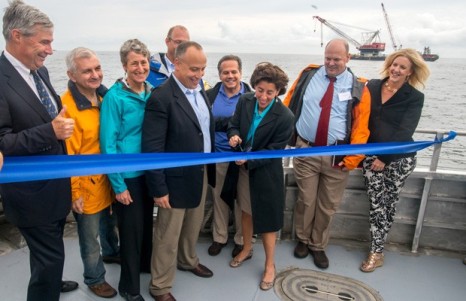
Offshore Wind Farm Costs $150,000 Per Home Currently Powered
An offshore wind farm in Rhode Island went online Monday, but building it costed $150,000 for every household powered. Three miles off the coast of Block Island, R.I., the wind farm is currently generating enough electricity to power 2,000 homes, but building the five turbines costed $300 million. That’s roughly $150,000 per household just to build the turbines, not to operate them. To put this in some perspective, the U.S.’s newest nuclear reactor, Watts Bar Unit 2, cost $4.7 billion to build but powered 4.5 million homes. The extremely high cost of offshore wind doesn’t worry environmentalists and progressives however, because, “it’s the precedent that counts.” click here to read the rest 11:37
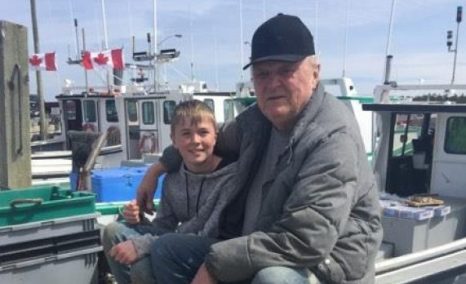
Family that fishes together: Bill MacEachern passing on tradition to next generation
Lobster season is under way in northeastern New Brunswick. Fishermen set out from wharves all along the north shore and Acadian Peninsula at first light Monday morning to set their traps. It’s a time-honoured tradition, especially for Bill MacEachern, who has been fishing out of Tabusintac for 55 years. Everything went well on day one, he told Shift‘s Vanessa Vander Valk. “It went great. It was a beautiful day, everybody got set, there were only two or three boats that had little problems,” he said. “Usually a few fellows have their motors go or something like that happen, but this year everybody was really lucky.” After 55 years on the water, he’s seen it all in the industry. “You wouldn’t believe the changes,” he said. click here to read the story, and watch a video 09:21
No fishery disaster relief funds for nine West Coast fisheries in Congress’ $1T spending bill
 Lawmakers on Monday unveiled a huge $1 trillion-plus spending bill that would fund most government operations through September but would deny President Donald Trump money for a border wall and rejects his proposed cuts to popular domestic programs. The bill also does not include millions in disaster relief funds for nine West Coast fisheries that fishermen and a group of 17 West Coast senators and members of Congress had hoped congressional leaders would include. “We’re definitely not holding out hope for any sort of last minute tack-on for the deal, but there is always the opportunity for Congress to appropriate separately,” Pacific Coast Federation of Fishermen’s Associations Executive Director Noah Oppenheim told the Times-Standard on Monday. “Although, the chances of that happening are slim to none.” click here to read the story 08:21
Lawmakers on Monday unveiled a huge $1 trillion-plus spending bill that would fund most government operations through September but would deny President Donald Trump money for a border wall and rejects his proposed cuts to popular domestic programs. The bill also does not include millions in disaster relief funds for nine West Coast fisheries that fishermen and a group of 17 West Coast senators and members of Congress had hoped congressional leaders would include. “We’re definitely not holding out hope for any sort of last minute tack-on for the deal, but there is always the opportunity for Congress to appropriate separately,” Pacific Coast Federation of Fishermen’s Associations Executive Director Noah Oppenheim told the Times-Standard on Monday. “Although, the chances of that happening are slim to none.” click here to read the story 08:21

































